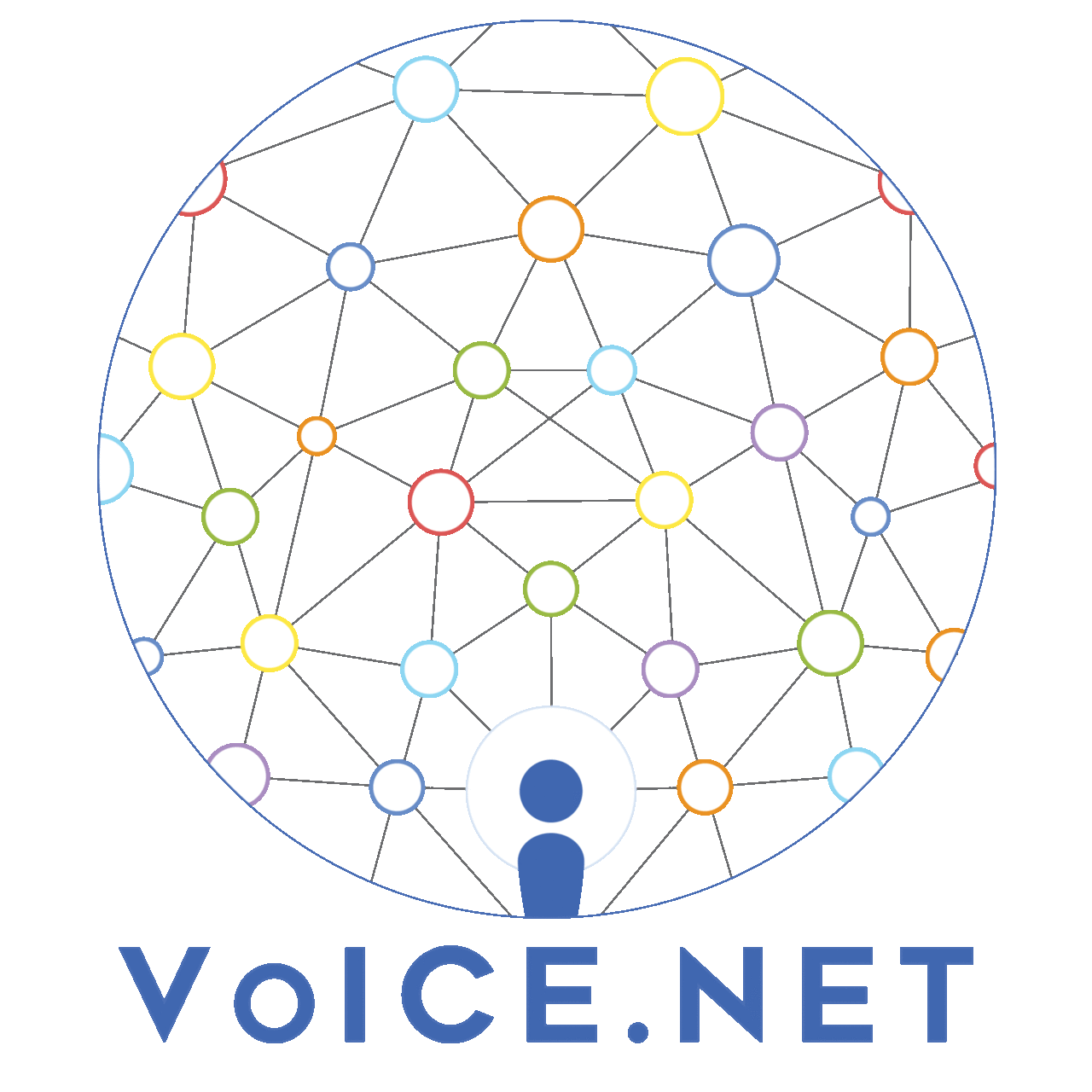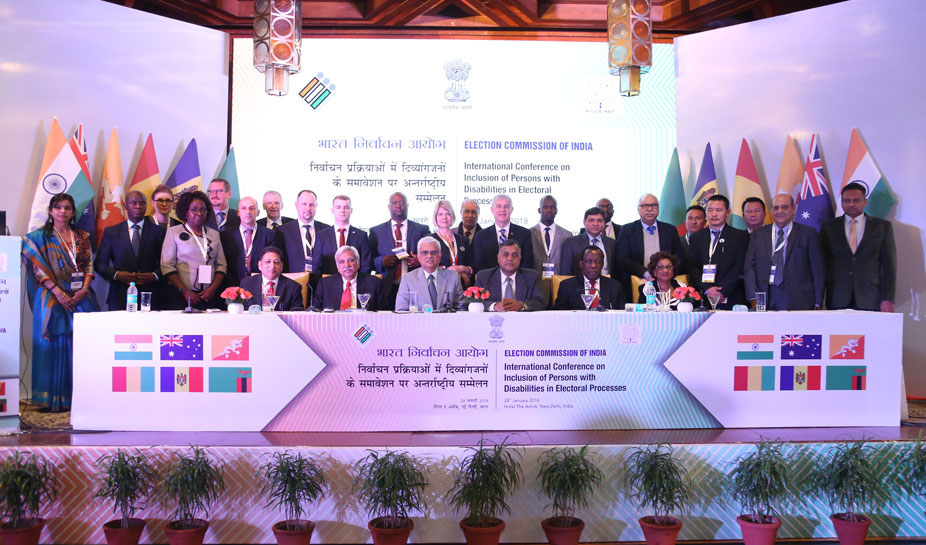
Global Knowledge Network On Voter Education - learning from each other
The Election Commission of India organized a one-day International Conference on the Inclusion of Persons with Disabilities (PwDs) in Electoral Processes on 24th Jan, 2018 at New Delhi as a part of the National Voters' Day Celebration. Hon'ble Chief Election Commissioner and the Election Commissioners of India, Dignitaries from five EMBs Former Chief Election Commissioners of India besides Secretary General, International IDEA, President and CEO, IFES, Experts, senior officials, reps of CSOs etc participated. Highlights of the Conference follow.

Inaugural Session
Mr Umesh Sinha, Senior Deputy Election Commissioner, ECI while welcoming the Dignitaries highlighted the significance of the National Voters' Day celebrations on 25th January every year, he said that 'Accessible Elections' is a priority area for ECI and has been adopted as the central theme for the NVD celebrations for 2018. The theme, seamlessly integrates into the constitutional mandate of universal adult suffrage and underlying concept of the Commission 'No voter to be left behind'. He said that the conference intends to share and learn from the experience of each other for enriching the Knowledge Base on the subject.
Mr Ashok Lavasa, Hon'ble Election Commissioner, in his remarks, mentioned that the guidance emanating from international Treaties such as the Universal Declaration on Human Rights, UN Convention on the Rights of the Persons with Disabilities has helped in shaping the policies and legislations of different countries on inclusion of the PwDs in electoral participation. He said that elections provide a unique opportunity to enhance participation and change public perceptions about potential of the PwDs and include their voice as equal citizens. He quoted the famous words of Stephen Hawking "We have a moral duty to remove the barriers to participation, and to invest sufficient funding and expertise to unlock the vast potential of people with disabilities'. He said different countries have developed impressive strategies for voter education, outreach and facilitation for inclusion in coordination with other stakeholders through well designed campaigns and technology based interventions to support their inclusion and a notable good work has been done in the area. He looked forward to a robust interaction during the conference and to gain from each others' experience.
Mr Sunil Arora, Hon'ble Election Commissioner, in his remarks, said that the Founding Fathers of the Nation embedded inter alia Universal Adult Suffrage, maintenance of electoral rolls and other fundamentals for conduct of free, fair and inclusive elections. These features with the basic tenet of 'No Voter to be left behind' provide a perfect blend for inclusion. He said that the PwDs have desire and capacity to participate, but they face barriers. He said that the Strategic Plan of the ECI for the years 2016-25 envisages inter alia specific interventions for focus on empowering PwDs. Accordingly comprehensive directions/guidelines have been issued by the Commission for removal of barriers; motivating, facilitating and enhancing participation by PwDs on equal basis. Good lot of work has been done by different stakeholders. We need to consolidate and move further.
He shared his inspiring experience of hosting Dr Stephen Hawking as an amazing personality and then mentioned about Dr Alim Chandani, an academician from University of Washington. He said that Dr Chandani, despite being an audio impaired person, has done pioneering work for audio impaired persons in India. He said that we should seek guidance from such eminent personalities with a view to utilize their potential for encouraging and enhancing inclusion. He said much good work has been done in the country and good practices developed and the Commission intends to have a sharp focus on consolidation and improvement during the year.
Mr O P Rawat, Hon'ble Chief Election Commissioner, in his Inaugural address, reiterated the ECI's resolve to uphold the sanctity of free, fair and peaceful elections in keeping with the rich democratic traditions of the India. He said that the ECI is committed to the cause of 'Persons with Disabilities' for right to exercise their franchise. He mentioned that the framework for empowering PwDs for enhanced electoral participation is in place but it is necessary to move away from tokenism. In this context he said that we have to shift our focus and see that the actual situation on the ground improves in the form of outcomes in terms of registration in rolls, facilitation and actual polling by PwDs. He expressed the hope that at the end of the day all the participants should have a 'Take Away' from the Conference in terms of Knowledge sharing and learning from the experiences of each other.
Session I: Nature and extent of Barriers to Accessibility in Electoral Participation of the PwD's- Analysis and Strategies for addressing the Barriers.
Mr David Lang, Member, AEC's Senior Executive Service Leadership Group, during his presentation, spoke on Empowerment of the PwDs for electoral participation through Information and Technology. He said that the AEC's support services based on technology approach facilitate both the registration and polling. The services include Blind and low vision voting, Telephone Voting for visually impaired and all the information is made available on the AEC website, Guide for Election Time and other means for guidance of the PwDs. He said Plain English guides are also made available inside the polling stations. The Disability Sector Stakeholders 'Vision Australia' and the 'Australian Human Rights Commission' are associated with the AEC for work related to the PwDs and their participation.
Mr Mani Kumar Ghaley, Chief Planning Officer at the Election Commission of Bhutan mentioned that in Bhutan, they were very awake to 'Inclusion.' He said that the legal provisions under Section 323 of the electoral legislation of Bhutan provide for responsibility of the election officials in the matter of assistance to PwDs. The assistance includes physical assistance, preferential access, voter awareness, and special considerations including helicopter service at inaccessible places. He added that Discussion Forums at all levels also facilitate participation of the PwDs.
Challenges include accessibility at the polling station level wherever the road connectivity is weak and prevalence of negative attitudes. Interventions involve assistance through advocacy, CSOs, Government Agencies, Royal Patronage and the concept of 'Awareness Villages'.
Session II: Innovation and Technology in facilitating Electoral participation of PwDs/ Efficiency and Efficacy of the existing facilitation to the PwDs for electoral participation'- Scope of Outreach and Campaigns for PwDs
Mr Umesh Sinha, Senior Deputy Election Commissioner, ECI highlighted the significance of NVD and adoption of 'Accessible Elections' on the eve of this year's NVD celebrations. He said that the Conference is a part of ECI's endeavor to make elections accessible to all. During his presentation titled 'Crossing the Barriers: Making Elections Friendly and Accessible for PwDs in India', he briefed the delegates on major barriers and challenges faced by PwDs as also the Initiatives taken by the ECI including technology based initiatives for their inclusion in Electoral Process.
He said that Barriers include inter alia inaccessibility, lack of infrastructure, lack of sensitized and aware polling personnel besides lack of motivation and voter education. ECI' guidelines prescribe that the PwDs have full right to participation and equality and not be discriminated against on any grounds. While several measures have been taken to facilitate their registration as voters, they are given priority at the polling stations, a companion is permitted with them to facilitate voting and EVMs have been printed with Braille. Assured Minimum Facilities are ensured at all the Polling Stations. Further consolidation of facilities is being done and as such, ECI is committed to enhance their participation. He said that the third issue of VoICE International is dedicated to the cause of PwDs and carries rich material on the subject.
Mr Corneliu Passat, Acting Head of Media Division, CEC, Moldova made a detailed presentation that provides legislative safeguards emanating from CRPD, the Law on Social Inclusion and other regulations and instructions. He said that alternative voting procedures were including voting at place of stay with a mobile voting box have been provided. Template-envelope is provided for visually impaired besides other facilities. PwDs are included as members of the precinct electoral bureau with 31 national observers from "Motivation" association. Motivation and information of PwDs is also an important area of focus.
Mr Antonio Spinelli, International IDEA, Nepal spoke on expanding the definition of inclusion to all persons with disabilities. He said that exclusion of persons under the category of 'Mentally Disabled' needs to be addressed by widening the definition of PwDs.
Session III: Nature and Role of International Organizations, Non Government Organizations in promoting access to PwDs.
Mr William Sweeney, President and CEO, IFES started with a picture of a girl not able to put her polled ballot in the ballot box reflecting as to how the disabled need help in electoral participation. He explained the significance and import of Article 29 of the CRPD. He emphasized innovation in registration of PwDs through hiring of the Deputy Registrars, registration in shopping malls and the essence of voter education for facilitating the PwDs. He explained the facets of polling station access and the assistive devices and the importance of Poll worker training.
Mr Dylan Kasonde, Director IT, Election Commission of Zambia explained the legislative framework under the PwD Act, 2012 in Zambia. While mentioning the statistical details of the PwDs, he said that they provide facilities to them at the polling stations. The facilities include 'Voter Jacket' for the blind, ramps at the PSs. Assistance to PWDs, PwDs as voting Staff, priority of entry etc. He said their future plans include consolidation and improvement aimed at enhancement of facilities at the polling stations.
Mr Navin Chawla, former Chief Election Commissioner said that in view of the order of Supreme Court in the year 2005 they had made massive efforts. The achievements included construction of 101 thousand well designed ramps, Braille on the EVMs for visually disabled. He added that the focus was on larger category of people facing social exclusion and covered categories such as transgender.
Mr Yves Leterme, Secretary General, International IDEA spoke on quality of Democracy especially in terms of Sustainable Development Goal 16. SDG 16 includes promotion of peaceful and inclusive societies for sustainable development.
He said that enhanced registration and polling data should come from all the EMBs so that they can realize as to where the initiatives are yielding dividends.
Mr S D Sharma, Senior Fellow of the ECI spoke on the highlights of the conference and summed up the important points emanating from the presentations/addresses of the participants. He said that the event and its proceedings will be hosted on the VoICE.NET for larger dissemination.
In his concluding remarks Mr O P Rawat, Hon'ble Chief Election Commissioner of India mentioned that the deliberations of the Conference offered a rich experience sharing on the subject and there was a lot to 'Take Away' for every one emanating from the conference. He said that the deliberations of the Conference set the tone for consolidation and further action on the subject.
Mr Dhirendra Ojha, DG(IC), ECI presented a formal vote of thanks to the participants of the Conference.
S D Sharma
Senior Fellow
Election Commission of India